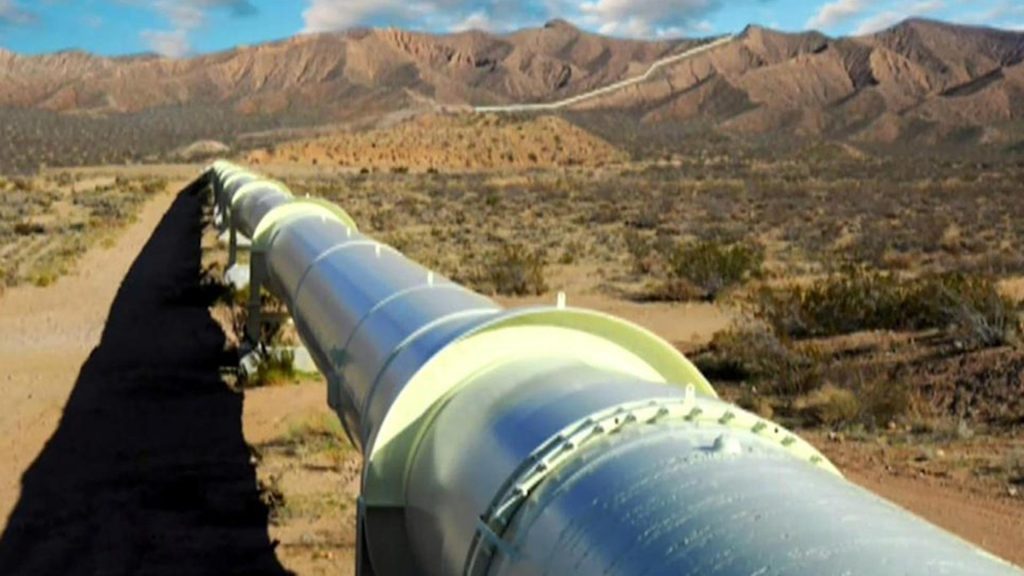
The Trans Mountain pipeline runs nearly 1,200 KM through central Alberta to the coast of B.C. Photo: APTN
The Stk’emlúpsemc te Secwépemc Nation in British Columbia is disputing a proposed route change by Trans Mountain for its pipeline through an area known as Pípsell.
Trans Mountain’s application was opposed by the Stk’emlúpsemc te Secwépemc Nation or SSN, whose traditional territory is being affected by the route change. The community originally agreed to a different route.
“In my opinion this is a really gross violation of Indigenous rights on unceded land after we have done some of the most significant work in the entire world to address our rights on this property,” said Mike McKenzie a local knowledge keeper for Secwepemc Nation.
“It is actually quite a significant site we have done extensive work on that site.” McKenzie has been a vocal opponent to the Trans Mountain Expansion Project for many years.
In its regulatory filing, the First Nation stated the area has “profound spiritual and cultural significance” to their people and that they only consented to the pipeline’s construction with the understanding that Trans Mountain would minimize surface disturbances by implementing specific trenchless construction methods.
“Honestly knowledge keepers didn’t agree and didn’t want a pipeline in that area,” said McKenzie about the project in general.
“[Trans Mountain Corporation] then showed up after the cost had ballooned over $30 billion and said that it’ll cost too much money and too much time so they have asked to go through the sacred site anyway,” he said.
In March 2017 the SSN released an assessment for a mining project in the same location as the Trans Mountain pipeline route. The reason was the cultural importance of the site for Indigenous medicines, food and ceremonies as well as the biodiversity of the area.
“The SSN does not—I’ll state it again—does not give its free, prior and informed consent to the development of lands known as Pipsell for the purpose of the development of the Ajax mine project,” Tk’emlups Chief Fred Seymour announced that day at a press conference in Kamloops.
Pipeline project never said the original construction method was ‘impossible’
The community argued that Trans Mountain never said its originally proposed construction method was impossible, only that it couldn’t be done in time to meet an early 2024 in-service date for the pipeline.
The First Nation didn’t respond to a request for comment by APTN News by the time this story was published.
But according to documents obtained by APTN, the community wrote to Trans Mountain Corporation to say that the new route will “cause significant and irreparable harm to SSN’s culture and the integrity of the Pipsell (Jacko Lake) corridor.
SSN requested that the Canadian Energy Regulator reject the proposed route.
It went ahead anyway.
The Canada Energy Regulator has approved Trans Mountain Corp.’s application to modify the pipeline’s route, a decision that could spare the government-owned pipeline project from an additional nine-month delay.
The regulator made the ruling Monday, just one week after hearing oral arguments from Trans Mountain and Stk’emlúpsemc te Secwépemc that opposed the route change.
McKenzie said he was not given an opportunity to speak at the meeting despite multiple attempts to contact people at the federal regulator.
“First of all the Canadian Energy Regulator did not give an opportunity for people like me to be in the room. I called several times leading up to the hearing,” McKenzie said.
The hearing was also held in Calgary, Alta., which is over 700 km away from Kamloops.
The regulator didn’t release the reasons for its decision Monday, saying those will be publicized in the coming weeks.
By siding with Trans Mountain Corp., the regulator is allowing the pipeline company to alter the route slightly for a 1.3-kilometre stretch of pipe in the Jacko Lake area, as well as the construction method for that section.
Trans Mountain Corp. had said it ran into engineering difficulties in the area related to the construction of a tunnel and warned that sticking to the original route could result in up to a nine-month delay in the pipeline’s completion, as well as an additional $86 million more in project costs.
The Trans Mountain pipeline is Canada’s only pipeline system transporting oil from Alberta to the West Coast. Its expansion, which is currently underway, will boost the pipeline’s capacity to 890,000 barrels per day (bpd) from 300,000 bpd currently.
Federal government response
APTN also reached out to the federal ministry for the environment for comment but was referred back to the Canadian Energy Regulator.
After a cabinet meeting today, the minister of Northern Affairs, Dan Vandal, was asked about the regulator’s decision to approve the new route.
He was asked by a member of the press gallery if the decision to go ahead with the new route over the objections of First Nations is a sign that reconciliation only happens when it is convenient.
Vandal rejected the premise of the question saying “our government has spent significant amount of money over the last eight years and partnerships were co-developed with Indigenous First Nations and Métis partners. Partnerships in education and the health in child welfare and economic development.”
For his part, McKenzie does feel disappointed by the government’s actions.
“You know if I had the opportunity I would speak to Trudeau directly and ask him why he doesn’t care about our people,” said McKenzie. “This to me just proves Trudeau doesn’t mean anything he says.”
A spokesperson for the Canadian Energy Regulator told APTN that the route change didn’t require ministerial approval or the approval of the prime minister.
“Trans Mountain provided written responses to the [affected communities] and no one responded to them,” said a spokesperson for the Canadian Energy Regulator.
In total 19 Indigenous communities received a letter from Trans Mountain Corporation about the proposed route change.
Pipeline costs increasing
The pipeline — which was bought by the federal government for $4.5 billion in 2018 after the previous owner Kinder Morgan Canada Inc. threatened to scrap the pipeline’s planned expansion project in the face of environmental opposition and regulatory hurdles — has already been plagued by construction-related challenges and delays.
Its projected price tag has since spiralled, first to $12.6 billion, then to $21.4 billion and most recently to $30.9 billion (the most recent capital cost estimate, as of March of this year).
Keith Stewart with Greenpeace Canada said it’s alarming to see the regulator over-rule the wishes of Indigenous people in order to complete a pipeline on deadline.
“Every Canadian should be outraged that our public regulator is allowing a publicly owned pipeline to break a promise to Indigenous people to protect lands of spiritual and cultural significance,” Stewart said.
The federal government has already approved a total of $13 billion in loan guarantees to help Trans Mountain secure the financing to cover the cost overruns.
Trans Mountain Corp. has blamed its budget problems on a variety of factors, including inflation, COVID-19, labour and supply chain challenges, flooding in B.C. and unexpected major archeological discoveries along the route.
Given the Canadian regulatory system has a reputation for being slow and cumbersome, it was surprising to see the Canada Energy Regulator rule so quickly on Trans Mountain’s route deviation request, said Richard Masson, executive fellow with the University of Calgary’s School of Public Policy.
“It’s a challenging decision to have to make, when you’ve got a $30 billion pipeline that needs to be completed,” Masson said. “If there’s no feasible way to do that tunnel, then I guess you have to allow for this.”
Masson added that if the regulator had denied Trans Mountain’s request, it would have been bad news for taxpayers as well as the federal government, which is seeking to divest the pipeline and has already entered into negotiations with several interested Indigenous-led buyers.
It also would have been bad news for Canadian oil companies, who have been eagerly anticipating the pipeline’s start date to begin shipping barrels to customers.
“If this can result in the pipeline being completed by year-end and started up in the first quarter, that’s good news. The world is still looking for oil, and oil prices are up at US $90 a barrel,” Masson said.
With files from the Canadian Press










